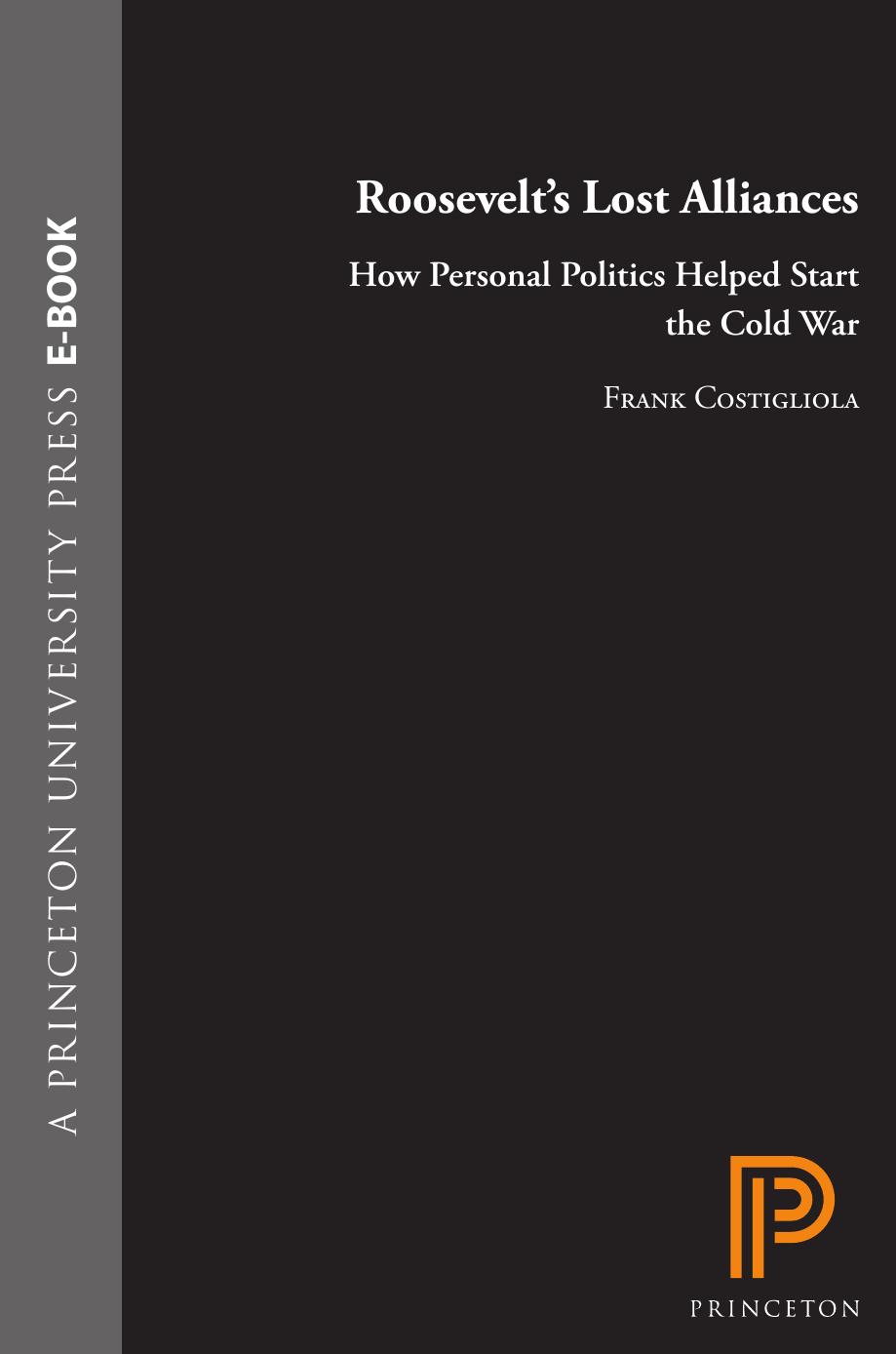Roosevelt's Lost Alliances: How Personal Politics Helped Start the Cold War by Frank Costigliola

Author:Frank Costigliola
Language: eng
Format: epub, pdf
Publisher: Princeton University Press
Chapter 8
Guns and Kisses in the Kremlin
Ambassadors Harriman and Clark Kerr Encounter Stalin, 1943–46
What the Russian-born British journalist Alexander Werth tagged as the wildest Kremlin party since 1917 lasted through the night of November 7–8, 1943. The “extremely sumptuous and extremely drunken” affair “sparkled with jewels, furs, gold braid, and celebrities,” he recalled.1 The last included Averell Harriman, his daughter Kathleen, and Archibald Clark Kerr. Following his bent and Soviet custom, the host, Foreign Minister Molotov, tried to get the envoys embarrassingly drunk. The festivities marked the anniversary of the Bolshevik Revolution and the liberation of Kiev. In a speech earlier that day, Stalin had warmly thanked Washington and London for sending war supplies. The dictator “praised the fighting in Italy as ‘not the Second Front but…something like the Second Front…which is now not so far away.”2 It was a heady moment: the October foreign ministers conference in Moscow had proven surprisingly cordial, and the Tehran summit was scheduled in a few weeks. The Big Three seemed on the road to postwar cooperation.
Heightening the anticipation were signs that the Kremlin was easing up on ideology and control. Historians will never know for sure whether these developments were solely wartime expedients or buds that might have blossomed absent the freeze that followed the collapse of the wartime alliance. When Clark Kerr asked Stalin why the huge photographs of Marx and Engels over his desk had been banished to a far corner (and replaced by oil portraits of victorious Russian generals), the dictator, referring to the founders of communist ideology, remarked, well, “after all, they weren't Russians.”3 The November 7 party signaled a further possible shift. For diplomats and journalists, a major source of frustration and anger was their forced isolation from Soviet citizens. Now, however, Kathleen noted with surprise, even “wives of officials…artists, writers, etc. [had gotten] invited to an official function and were allowed to mingle freely with foreigners.”4
She was also struck by the “dazzling” effect of the new uniforms worn by Molotov and other foreign ministry officials: black with gold buttons, gold braid, and lavish decorations denoting rank. The new attire evoked an ambiance more Ruritanian than proletarian. Kathleen alluded to the insecure vanity of her hosts while expressing her own condescension: “Each little individual Soviet was as proud as a little boy, all dressed up in his new Christmas present fireman's suit.” After Molotov had downed enough vodka, his pride and vulnerability poked through. He demanded of her why “I'd been the only one not to compliment his uniform! Because I didn't like it?” She commented that “the only [Westerner] not to look insignificant next to a Russian” in uniform was Clark Kerr, with his “big KCB red and blue ribbon worn…across his chest and stomach.”5
The drunken revelry peeled back the curtain from emotions, attitudes, and cultural differences that would make postwar collaboration difficult though not impossible. Both Harriman and Clark Kerr had determined to become key interlocutors between Stalin and their respective governments. Both regarded service in Moscow as a springboard.
Download
Roosevelt's Lost Alliances: How Personal Politics Helped Start the Cold War by Frank Costigliola.pdf
This site does not store any files on its server. We only index and link to content provided by other sites. Please contact the content providers to delete copyright contents if any and email us, we'll remove relevant links or contents immediately.
| Anthropology | Archaeology |
| Philosophy | Politics & Government |
| Social Sciences | Sociology |
| Women's Studies |
The Secret History by Donna Tartt(19052)
The Social Justice Warrior Handbook by Lisa De Pasquale(12187)
Thirteen Reasons Why by Jay Asher(8893)
This Is How You Lose Her by Junot Diaz(6877)
Weapons of Math Destruction by Cathy O'Neil(6264)
Zero to One by Peter Thiel(5786)
Beartown by Fredrik Backman(5737)
The Myth of the Strong Leader by Archie Brown(5499)
The Fire Next Time by James Baldwin(5431)
How Democracies Die by Steven Levitsky & Daniel Ziblatt(5215)
Promise Me, Dad by Joe Biden(5141)
Stone's Rules by Roger Stone(5081)
A Higher Loyalty: Truth, Lies, and Leadership by James Comey(4954)
100 Deadly Skills by Clint Emerson(4921)
Rise and Kill First by Ronen Bergman(4779)
Secrecy World by Jake Bernstein(4741)
The David Icke Guide to the Global Conspiracy (and how to end it) by David Icke(4706)
The Farm by Tom Rob Smith(4502)
The Doomsday Machine by Daniel Ellsberg(4484)
